Related Research Articles

The Belgian Blue is a breed of beef cattle from Belgium. It may also be known as the Race de la Moyenne et Haute Belgique, or dikbil. Alternative names for this breed include Belgian Blue-White; Belgian White and Blue Pied; Belgian White Blue; Blue; and Blue Belgian. The Belgian Blue's extremely lean, hyper-sculpted, ultra-muscular physique is termed "double-muscling". The double-muscling phenotype is a heritable condition resulting in an increased number of muscle fibres (hyperplasia), instead of the (normal) enlargement of individual muscle fibres (hypertrophy).
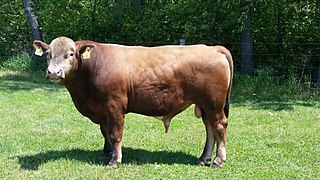
Beefalo constitute a hybrid offspring of domestic cattle, usually a male in managed breeding programs, and the American bison, usually a female in managed breeding programs. The breed was created to combine the characteristics of both animals for beef production.

The zebu, sometimes known in the plural as indicine cattle, Camel cow or humped cattle, is a species or subspecies of domestic cattle originating in South Asia. Zebu, like many Sanga cattle breeds, differs from taurine cattle by a fatty hump on their shoulders, a large dewlap, and sometimes drooping ears. They are well adapted to withstanding high temperatures and are farmed throughout the tropics.

The Somali cat is genetically similar to the Abyssinian cat. Due to inheriting 2 copies of the recessive gene for long hair, they have a characteristic luscious coat, unlike their cousin the Abyssinian.

The Highland is a Scottish breed of rustic cattle. It originated in the Scottish Highlands and the Western Islands of Scotland and has long horns and a long shaggy coat. It is a hardy breed, able to withstand the intemperate conditions in the region. The first herd-book dates from 1885; two types – a smaller island type, usually black, and a larger mainland type, usually dun – were registered as a single breed. It is reared primarily for beef, and has been exported to several other countries.

The Jersey is a British breed of small dairy cattle from Jersey, in the British Channel Islands. It is one of three Channel Island cattle breeds, the others being the Alderney – now extinct – and the Guernsey. The milk is high in butterfat and has a characteristic yellowish tinge.

The Aberdeen Angus, sometimes simply Angus, is a Scottish breed of small beef cattle. It derives from cattle native to the counties of Aberdeen, Banff, Kincardine and Angus in north-eastern Scotland. In 2018 the breed accounted for over 17% of the beef production in the United Kingdom.

The Australian Cattle Dog, or simply Cattle Dog, is a breed of herding dog developed in Australia for droving cattle over long distances across rough terrain. This breed is a medium-sized, short-coated dog that occurs in two main colour forms. It has either red or black hair distributed fairly evenly through a white coat, which gives the appearance of a "red" or "blue" dog.
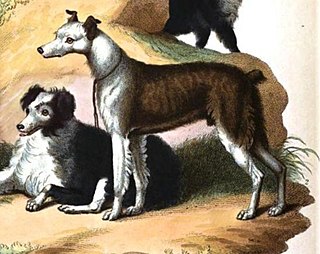
A cur was a dog breed used by cattle drovers in England. The breed is now extinct. In the United States, a short-haired dog used in hunting and herding is called "cur-tailed", or "cur" for short.

The Galloway is a Scottish breed of beef cattle, named after the Galloway region of Scotland, where it originated during the seventeenth century.

The Corriente is an American breed of small cattle, used principally for rodeo events. It derives from Criollo Mexicano stock, which in turn descends from Iberian cattle brought to the Americas by the Conquistadores, and introduced in the sixteenth and seventeenth centuries to various parts of what is now Mexico.
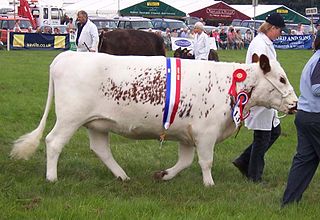
The Irish Moiled is a rare cattle breed from Ireland. It is a dual-purpose breed, reared for both beef and milk. It originated in County Leitrim, County Sligo, County Down, and County Donegal, but the breed is now found throughout Ireland.

The Randall Lineback or Randall is an American breed of cattle. It originated in Bennington County, Vermont, and is critically endangered.

The Florida Cracker Horse is a critically endangered horse breed from the state of Florida in the United States. It is genetically and physically similar to many other Spanish-style horses, especially those from the Spanish Colonial horse group, including the Banker horse of North Carolina, and the Carolina Marsh Tacky of South Carolina.
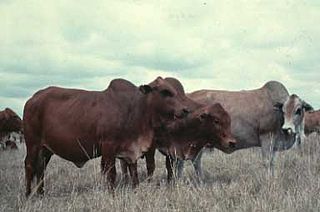
Boran cattle are a popular Zebu beef breed in eastern Africa.

The Piedmontese is a breed of domestic cattle that originated in the region of Piedmont, in north-west Italy. The calves are born fawn coloured, and turn grey-white as they mature. Piedmontese cattle carry a unique gene mutation identified as an inactive myostatin allele that causes hypertrophic muscle growth, or double muscling. Purebred Piedmontese cattle are homozygous, meaning they have two identical alleles present for this unique gene. They have garnered attention from breeders of beef cattle in other parts of the world, including North and South America. A small group of select Piedmontese bulls and cows were imported into Canada in the late 1970s, and into the United States in the early 1980s, and were used as the foundation breeding stock to develop a new breed of beef cattle known as North American Piedmontese cattle.
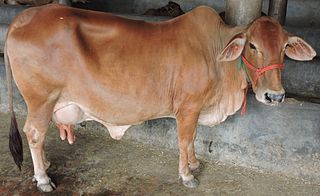
Sahiwal cattle is a breed of Indian zebu cow, named after the Sahiwal district of modern-day Pakistan.. The cattle is mainly found in Punjab province of Pakistan, and Indian states of Punjab, Haryana, & Rajasthan.
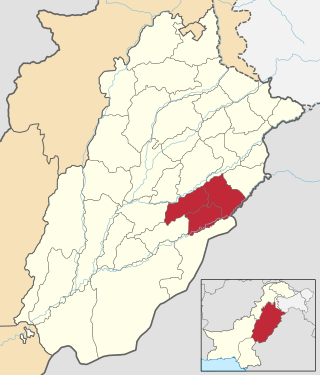
Sahiwal Division is one of the nine Divisions of Punjab province, Pakistan.

Cattle are large, domesticated, bovid ungulates widely kept as livestock. They are prominent modern members of the subfamily Bovinae and the most widespread species of the genus Bos. Mature female cattle are called cows and mature male cattle are bulls. Young female cattle are called heifers, young male cattle are oxen or bullocks, and castrated male cattle are known as steers.
References
- ↑ "DAGRIS". Archived from the original on 2016-03-04. Retrieved 2012-10-29.
- ↑ Porter, V (2002). A World Dictionary of Livestock Breeds, Types, and Varieties. CABI. p. 23. ISBN 0-85199-430-X.